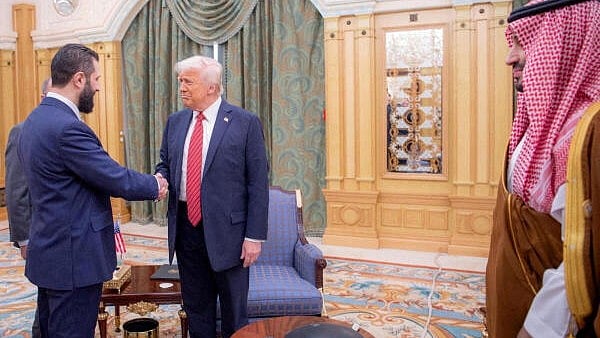
US President Donald Trump meets with Syrian President Ahmed al-Sharaa in Riyadh
Credit: Reuters Photo
President Donald Trump signed an executive order on Monday lifting most of the country’s economic sanctions on Syria, tightening his embrace of a new government in Damascus despite concerns about its leaders’ past ties to al-Qaida.
The move, which scrapped decades of U.S. policy toward Syria, delivered on a surprise announcement by Trump in May during a trip to the Middle East. At a stop in Saudi Arabia, Trump met with President Ahmad al-Sharaa of Syria, who assumed power in December after his fighters deposed longtime dictator Bashar Assad.
Trump declared al-Sharaa, who previously led a rebel group designated by the U.S. government as a terrorist organization, “young, attractive” and “tough,” and said Syria deserved “a chance” to rebuild after a devastating civil war that began in March 2011.
Some current and former US officials remain wary of al-Sharaa and his jihadi background, although he cut ties with al-Qaida several years ago. But Syria’s Arab neighbors are impatient to begin reconstructing Syria, a project that offers not only opportunities to profit but also a chance to stabilize a country that has long exported terrorism, migrants and illegal drugs. Crushing U.S. sanctions imposed during the harsh rule of Assad, some dating more than 20 years, have kept would-be investors on the sidelines.
Starting Tuesday, Trump’s executive order dismantles many of those sanctions, including ones against state-linked entities such as Syria’s central bank and other major financial institutions. Sanctions would remain on Assad, who fled to Russia, and his associates, as well as others accused of human rights abuses, drug smuggling and terrorist activities, Karoline Leavitt, the White House press secretary, told reporters Monday.
Leavitt said Trump was delivering on a promise he made in Saudi Arabia that had “shocked the world.”
The move extends action the Trump administration took in late May to provide Syria with immediate relief from some sanctions. Trump’s order also instructs Secretary of State Marco Rubio to examine whether to ask Congress to repeal a 2019 package of sanctions over human rights concerns, known as the Caesar Act.
“The United States is committed to supporting a Syria that is stable, unified, and at peace with itself and its neighbors. A united Syria that does not offer a safe haven for terrorist organizations and ensures the security of its religious and ethnic minorities will support regional security and prosperity,” Trump said in the text of the order.
The friendly tone of Trump officials is an evolution from Trump’s initial reaction to Assad’s downfall in December. “Syria is a mess, but is not our friend,” he posted on the social platform X at the time, adding of the country’s internal conflicts: “THE UNITED STATES SHOULD HAVE NOTHING TO DO WITH IT.”
Trump’s action “basically is going to give a blanket opportunity around all the things that we need to turn back on this economy,” the president’s special envoy for Syria, Thomas J. Barrack Jr., said Monday in a briefing for reporters.
Barrack said Trump would watch to ensure that al-Sharaa’s government meets its commitments on matters like ensuring that terrorists do not take root in his country. But he added that U.S. officials would not be “nation building” in Syria, nor “dictating” what Syrian society should look like.
“They’re not giving the framework of the democratic model that needs to be implemented to their architecture or desire,” he said. “They’re saying we are going to give you an opportunity.”
Syria’s foreign minister, Asaad Hassan al-Shaibani, said Monday that the executive order marked “a historic turning point” in Syria’s postwar recovery.
“This removes the major obstacle to economic recovery, opening the doors for reconstruction and development that has long been awaited,” he said in a post on social media.
Trump’s embrace of al-Sharaa is the latest blow to Iran’s Islamist government, which supported Assad for decades, enjoying political and military influence in his country, and sought to save him from overthrow by rebel groups like al-Sharaa’s.
His meeting with the Syrian leader in May stunned many Middle East analysts. “It is still hard to comprehend that the so-called leader of the free world shook hands with the man who led Hayat Tahrir al-Sham,” Dr. Neil Quilliam, an associate fellow with the Middle East and North Africa program at Chatham House, wrote at the time.
He added that removal of U.S. sanctions “will allow the unfreezing of Syria’s international assets, enable foreign businesses to re-enter key sectors such as construction, energy and trade, and restore Damascus’s access to global financial systems and credit.”
Brad Smith, acting undersecretary for terrorism and financial intelligence, told reporters on Monday that U.S. sanctions imposed during Assad’s rule had served their purpose.
“Our sanctions played an important role in limiting Assad’s ability to wage war against his own people and frustrating his cronies’ efforts to enrich themselves at the expense of the country and the Syrian people,” Smith said.